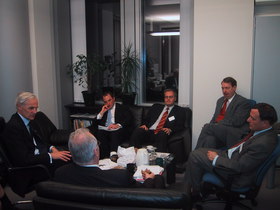

Political parties
The Lisbon Treaty regulates European political parties in Article 224 TFEU.
The EU currently has ten transnational parties and associations recognised as European parties according to the EU statute concerning European political parties.
The so-called EU statute provides funding from the EU budget for these transnational political parties and their associates. To become eligible for funding, a party must have support in at least 25% of the member states.
Members may come from the European Parliament, the national parliament or regional parliaments. Members of local counties does not count. With 28 member states seven nationalities must sign for approval.
This statute was adopted by a qualified majority vote under the Treaty of Nice. For quite some time, Liberals, Christian Democrats, Socialists, Greens and Regionalists have had transnational parties that qualify for EU funding.
Originally, the transnational parties receive subsidies from the EU budget. The subsidies have been criticised by the Court of Auditors as being illegal. The party statute remedied this by making public funding legal. Private donations above 100 Euro must be registered. No individual donation can be above 12,000 € per person per year.
345 votes for, 102 votes against and 34 abstaining in the European Parliament adopted the Party Statute. More court cases were being prepared challenging the Party statute but these cases were lost.
The plaintiffs claimed that European Parties do not exist; only national parties exist. These parties are part of European alliances, but not 'genuine' parties in which you can become member and have influence.
The opponents claimed that it should not be possible to make a distinction between the parties running for the European Parliament and to national elections.
EUROPEAN POLITICAL PARTIES:
Notes
The approval of Libertas as a European political party in 2009 was suspended by the President of the Parliament when two of the 7 signatures were questioned. Libertas then offered other signatures stating they had more signatures than needed.
The party chairman Declan Ganley had anyway declared, he would not take tax payers money“ before he would have a popular mandate in the European elections in June 2009. When he failed being elected he did not apply for funds.